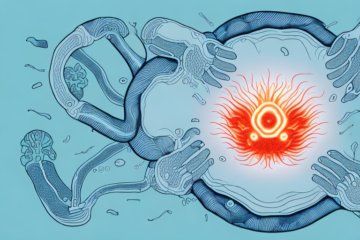Hashimoto’s Thyroiditis is a condition that affects the thyroid gland, which is responsible for producing hormones that regulate metabolism. This autoimmune disorder occurs when the body’s immune system attacks the thyroid gland, causing inflammation and damage. In this article, we will discuss the causes, symptoms, diagnosis, and management of Hashimoto’s Thyroiditis in detail.
What is Hashimoto’s Thyroiditis?
Hashimoto’s Thyroiditis, also known as chronic lymphocytic thyroiditis, is an autoimmune disease that affects the thyroid gland. The condition causes the body’s immune system to attack the thyroid, resulting in inflammation and damage to the gland. As a result, the thyroid gland becomes unable to produce enough hormones.
Hashimoto’s Thyroiditis is more common in women than men, and it typically develops in middle-aged individuals. The condition can also be hereditary, meaning that it can be passed down from parents to their children.
Some of the common symptoms of Hashimoto’s Thyroiditis include fatigue, weight gain, sensitivity to cold, dry skin, hair loss, and joint pain. If left untreated, the condition can lead to more severe symptoms such as depression, memory problems, and heart problems.
Symptoms of Hashimoto’s Thyroiditis
Hashimoto’s Thyroiditis can cause a range of symptoms, including:
- Fatigue
- Weight gain or difficulty losing weight
- Sensitivity to cold
- Muscle weakness
- Joint pain or stiffness
- Constipation
- Depression or anxiety
- Menstrual irregularities
- Swelling in the neck due to an enlarged thyroid gland (goiter)
It is important to note that not everyone with Hashimoto’s Thyroiditis will experience all of these symptoms, and some individuals may not experience any symptoms at all. Additionally, the severity of symptoms can vary greatly from person to person. It is important to speak with a healthcare provider if you suspect you may have Hashimoto’s Thyroiditis or are experiencing any of these symptoms.
Causes of Hashimoto’s Thyroiditis
The exact cause of Hashimoto’s Thyroiditis is unknown, but it is believed to be a combination of genetic and environmental factors. Women are more likely to develop the condition than men, and it often runs in families. Some of the environmental factors that may contribute to the development of Hashimoto’s Thyroiditis include exposure to radiation, iodine deficiency, and viral infections.
Recent studies have also suggested that certain lifestyle factors may increase the risk of developing Hashimoto’s Thyroiditis. For example, smoking has been linked to an increased risk of autoimmune thyroid diseases, including Hashimoto’s Thyroiditis. Additionally, chronic stress and poor sleep quality may also play a role in the development of the condition.
It is important to note that while certain factors may increase the risk of developing Hashimoto’s Thyroiditis, the condition can still occur in individuals with no known risk factors. Therefore, it is important to be aware of the symptoms of the condition and to seek medical attention if you experience any of them, such as fatigue, weight gain, and sensitivity to cold temperatures.
Diagnosis of Hashimoto’s Thyroiditis
Hashimoto’s Thyroiditis is diagnosed through a combination of physical examination, blood tests, and imaging studies. The doctor will perform a physical exam to check for an enlarged thyroid gland, and may order blood tests to check the levels of thyroid hormones and antibodies. Imaging studies such as ultrasound or a thyroid scan may also be done to assess the condition of the thyroid gland.
In addition to these diagnostic tests, the doctor may also ask about any symptoms the patient is experiencing, such as fatigue, weight gain, or sensitivity to cold. It is important to note that Hashimoto’s Thyroiditis can sometimes be difficult to diagnose, as symptoms may be mild or non-specific. In some cases, a biopsy of the thyroid gland may be necessary to confirm the diagnosis.
Risk factors for developing Hashimoto’s Thyroiditis
Some factors that increase the risk of developing Hashimoto’s Thyroiditis include:
- Being female
- Having a family history of thyroid disease or autoimmune disorders
- Exposure to radiation
- Iodine deficiency
- Having another autoimmune disorder
Recent studies have also suggested that certain viral infections may increase the risk of developing Hashimoto’s Thyroiditis. In particular, the Epstein-Barr virus has been linked to an increased risk of developing autoimmune thyroid disease. Other viruses that have been associated with an increased risk include the human T-cell lymphotropic virus and the hepatitis C virus.
Treatment options for Hashimoto’s Thyroiditis
Although there is no cure for Hashimoto’s Thyroiditis, there are several treatment options available to manage the symptoms and prevent complications. Treatment may include medications, lifestyle changes, and surgery in severe cases.
One of the most common medications used to treat Hashimoto’s Thyroiditis is levothyroxine, which is a synthetic form of the thyroid hormone. This medication helps to replace the hormone that the thyroid gland is not producing enough of, and can help to alleviate symptoms such as fatigue, weight gain, and depression.
In addition to medication, lifestyle changes can also be helpful in managing Hashimoto’s Thyroiditis. Eating a healthy diet, getting regular exercise, and reducing stress can all help to improve symptoms and overall health. Some people may also benefit from supplements such as selenium, which has been shown to have a positive effect on thyroid function.
Medications for treating Hashimoto’s Thyroiditis
Medications such as levothyroxine can be used to replace the thyroid hormones that the thyroid gland is no longer producing. This medication is taken orally and must be taken for life to maintain normal thyroid hormone levels.
In addition to hormone replacement therapy, some patients with Hashimoto’s Thyroiditis may also benefit from medications that suppress the immune system. These medications, such as corticosteroids or immunosuppressants, can help reduce inflammation and slow down the progression of the disease. However, they may also have side effects and should only be used under the guidance of a healthcare professional.
Lifestyle changes to manage Hashimoto’s Thyroiditis
Adopting healthy lifestyle habits such as getting regular exercise, managing stress, and getting enough sleep can help to manage the symptoms of Hashimoto’s Thyroiditis. Additionally, avoiding foods that are goitrogens (foods that can interfere with thyroid function) such as soy, kale, and broccoli may be helpful.
Another important lifestyle change to manage Hashimoto’s Thyroiditis is to ensure that you are getting enough iodine in your diet. Iodine is essential for the production of thyroid hormones, and a deficiency can worsen the symptoms of Hashimoto’s. Good sources of iodine include seaweed, fish, and dairy products.
In addition to dietary changes, it is also important to work closely with your healthcare provider to monitor your thyroid hormone levels and adjust your medication as needed. It may also be helpful to explore alternative therapies such as acupuncture or herbal supplements, but it is important to discuss these options with your healthcare provider before trying them.
Diet recommendations for managing Hashimoto’s Thyroiditis
Eating a balanced diet that is low in processed foods, high in whole foods, and rich in nutrients like selenium, zinc, and iodine may help to manage the symptoms of Hashimoto’s Thyroiditis. Additionally, avoiding foods that are high in sugar or refined carbohydrates may be beneficial.
It is also recommended to limit or avoid gluten-containing foods as they may trigger an autoimmune response in some individuals with Hashimoto’s Thyroiditis. Including probiotic-rich foods like yogurt, kefir, and sauerkraut in your diet may also support gut health and improve overall immune function.
Exercise and physical therapy for managing Hashimoto’s Thyroiditis
Regular exercise can help to improve overall health and reduce inflammation, which may help to manage the symptoms of Hashimoto’s Thyroiditis. Physical therapy may also be helpful for managing joint pain or stiffness caused by the condition.
In addition to reducing inflammation, exercise can also help to improve mood and reduce stress levels, which can be beneficial for individuals with Hashimoto’s Thyroiditis. Studies have shown that regular exercise can improve mental health and reduce symptoms of anxiety and depression.
Physical therapy can also be helpful for individuals with Hashimoto’s Thyroiditis who experience muscle weakness or fatigue. A physical therapist can work with the individual to develop a personalized exercise plan that targets specific muscle groups and helps to improve overall strength and endurance.
Coping with the emotional impact of Hashimoto’s Thyroiditis
Managing a chronic illness like Hashimoto’s Thyroiditis can be challenging and may cause emotional stress. It is important to seek support from friends, family, or a mental health professional if needed. Additionally, practicing stress-management techniques like meditation, deep breathing, or yoga may be helpful.
It is also important to educate yourself about the condition and its effects on your body. This can help you better understand and manage your symptoms, as well as communicate effectively with your healthcare provider. Joining a support group or online community can also provide a sense of belonging and understanding, as well as a platform to share experiences and advice with others going through similar challenges.
Support groups and resources for individuals with Hashimoto’s Thyroiditis
There are many online and in-person support groups available for individuals with Hashimoto’s Thyroiditis. These groups can provide a safe space to connect with others who are going through similar experiences and can offer emotional support and practical advice.
In addition to support groups, there are also various resources available for individuals with Hashimoto’s Thyroiditis. These resources include educational materials, such as books and websites, that can help individuals better understand their condition and manage their symptoms. Additionally, some healthcare providers may offer specialized care for individuals with Hashimoto’s Thyroiditis, including endocrinologists and integrative medicine practitioners.
Complications of untreated or poorly managed Hashimoto’s Thyroiditis
If left untreated or poorly managed, Hashimoto’s Thyroiditis can lead to a range of complications such as:
- Hypothyroidism
- Myxedema (severe hypothyroidism)
- Cardiovascular disease
- Mental health disorders such as depression or anxiety
- Birth defects in pregnant women with untreated hypothyroidism
Another potential complication of untreated or poorly managed Hashimoto’s Thyroiditis is goiter, which is an enlargement of the thyroid gland. This can cause difficulty swallowing or breathing, as well as a visible swelling in the neck.
In rare cases, Hashimoto’s Thyroiditis can also lead to thyroid lymphoma, a type of cancer that affects the thyroid gland. This is more likely to occur in individuals who have had the condition for a long time and have not received proper treatment.
Preventing future complications and managing long-term health with Hashimoto’s Thyroiditis
Regular follow-up appointments with a healthcare provider and adherence to treatment recommendations can help to prevent future complications and manage long-term health for individuals with Hashimoto’s Thyroiditis.
In addition to regular follow-up appointments and adherence to treatment recommendations, individuals with Hashimoto’s Thyroiditis can also benefit from making lifestyle changes to support their overall health. This may include incorporating regular exercise, eating a balanced and nutrient-dense diet, and managing stress levels.
It is also important for individuals with Hashimoto’s Thyroiditis to be aware of potential triggers that can exacerbate their symptoms. These may include certain foods, environmental toxins, and medications. By identifying and avoiding these triggers, individuals can better manage their condition and improve their overall quality of life.
Frequently asked questions about Hashimoto’s Thyroiditis
Some frequently asked questions about Hashimoto’s Thyroiditis include:
- Is Hashimoto’s Thyroiditis a curable condition?
- Can Hashimoto’s Thyroiditis be passed down through families?
- What foods should I avoid with Hashimoto’s Thyroiditis?
- Can exercise worsen the symptoms of Hashimoto’s Thyroiditis?
- What is the long-term outlook for individuals with Hashimoto’s Thyroiditis?
Consulting with a healthcare provider is the best way to get reliable answers to these and other questions about Hashimoto’s Thyroiditis.
Hashimoto’s Thyroiditis is an autoimmune disorder that affects the thyroid gland. It occurs when the immune system attacks the thyroid gland, causing inflammation and damage to the gland. This can lead to an underactive thyroid, also known as hypothyroidism.
Some common symptoms of Hashimoto’s Thyroiditis include fatigue, weight gain, hair loss, dry skin, and sensitivity to cold. These symptoms can be managed with medication and lifestyle changes, but it is important to work with a healthcare provider to develop a treatment plan that is right for you.










